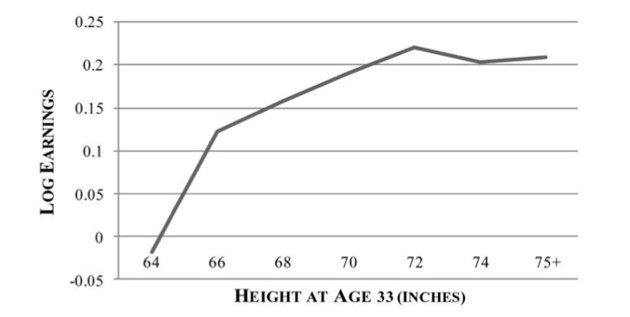
It's good to be tall. Andrzej Kubik/Shutterstock.com
The Financial Perks of Being Tall
An extra inch correlates with an estimated $800 in increased annual earnings.
In the 1960s and 70s, Thomas Gregor, an anthropologist at Vanderbilt, traveled to central Brazil to see if height was prized by people beyond the developed world. For years, he observed the Mehinaku, a group that lived in the tropical forest and was so thoroughly unmodern that they had never seen eyeglasses. He spent time with the Navajo and the Trobriand Islanders of Papua New Guinea, too. “In no case,” he would later write, “have I found a preference for short men.”
The bias that Gregor showed to be embedded into human social life plays out quantifiably in the professional world: In Western countries, a jump from the 25th percentile of height to the 75th—about four or five inches—is associated with an increase in salary between 9 and 15 percent. Another analysis suggests that an extra inch is worth almost $800 a year in elevated earnings. “If you take this over the course of a 30-year career and compound it,” one researcher told Malcolm Gladwell for his book Blink, “we’re talking about a tall person enjoying literally hundreds of thousands of dollars of earnings advantage.” (The research suggests that height makes only slightly more a difference for men than women.)
While every additional inch appears to be an advantage, some inches are worth more than others, according to one recent study. Among men, the sharpest jump in earnings the researchers documented was between 5’4” and 5’6”. They found that the returns on height begin to plateau around 6’0”.
The Returns on an Additional Inch, for Men

Schick and Steckel
It used to make sense that height would be valued when picking people to do jobs: The tallest people were often the biggest and the strongest, and most tasks demanded size and strength. But the height premium has persisted even as more and more jobs have become desk jobs. Economists have sought a satisfactory explanation ever since that change started taking hold.
The beginning of this scholarship (at least in the U.S.) was NYU professor Enoch Burton Gowin’s The Executive and His Control of Men: A Study in Personal Efficiency, published in 1915. Gowin’s data collection revealed not just the difference between the heights of executives and “average men,” but also that bishops tended to be taller than preachers, and sales managers taller than the salespeople reporting to them.
Since the publication of Gowin’s book, researchers proposed a few possible explanations for why taller people attained white-collar jobs at higher rates. Some studies suggested that taller people have better social skills and more self-confidence (“noncognitive” skills, as academics would say). People who were taller as children, the thinking goes, were treated better, so they developed more emotional stability, which has been shown to help on the job. Meanwhile, other studies have have found that taller people are inherently smarter: As early as age three, they do better on aptitude tests.
According to a new paper, the answer was a little bit of everything. The paper’s two authors, Andreas Schick, an economist at the FDA, and Richard Steckel, an economist at the Ohio State University, analyzed data from the United Kingdom tracking a group of Britons born in 1958 and concluded that neither cognitive nor noncognitive advantages can alone explain the earnings difference. Since both play significant roles in producing the height premium, they argue, the truly important variable is how well-fed a child is. Nutrition is a major deciding factor when it comes to height, which in turn means it affects intelligence and those highly helpful “noncognitive” skills.
In addition to performing those calculations, Schick and Steckel also came away with some correlations that, while not inconsistent with previous research, are still striking. For every two-inch increase in a child’s height, the improvement on cognitive and noncognitive assessments is roughly equivalent to the difference between growing up in a lower-class family and a middle-class family. And it’s not just height in childhood that goes on to shape future earnings: 11-year-old boys who were considered “attractive” (creepily enough, these ratings were determined by teachers) went on to make 6.5 percent more money in their thirties than their more homely peers did. For girls, it was a 10 percent boost.
The perks of height do not end with money. A study published a couple months ago used data collected by the German government to look more specifically at the professional lives of the relatively tall. It found that each additional inch of height makes one slightly more likely to be an entrepreneur, as opposed to working a desk job. And while most of those self-employed giants reported roughly equal levels of job satisfaction, employed people who were tall said they were more pleased with their professional lives than did shorter employees. If those cursed with below-average height have made it this far in the article, they might want to finally jump ship and ignore this final line: Those taller employees also reported being happier with life in general.
(Image via Andrzej Kubik/Shutterstock.com)
NEXT STORY: The Endangered Species Act Is Getting A Makeover






